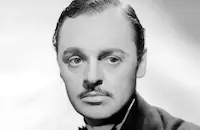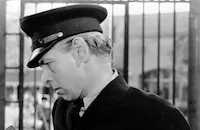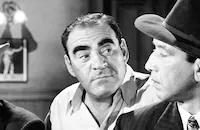Moontide
Brief Synopsis
Cast & Crew
Archie Mayo
Jean Gabin
Ida Lupino
Thomas Mitchell
Claude Rains
Jerome Cowan
Film Details
Technical Specs

Synopsis
French-born dock worker Bobo travels from town to town, performing odd jobs and getting drunk at every opportunity. One evening, he comes to San Pablo, California, to meet his Irish friend Tiny, who finds jobs for him. Tiny tells him that there is a job waiting for him elsewhere, and Bobo spends the rest of the night drinking, fighting and flirting with a saloon girl named Mildred. The next morning, Bobo awakens on a bait barge belonging to "Henry" Hirota and his son Takeo. When Henry arrives, he explains to Bobo that they met while Bobo was drunk, and that Bobo agreed to work for him. After policeman George comes by, Takeo explains that Pop Kelly, a grumpy old sailor whom Bobo also met, was choked to death during the night. Bobo is horrified, for he fears that he may be the culprit, and finds Tiny, who wants to go to San Francisco. Bobo agrees, then spends the afternoon with Nutsy, a philosophical night watchman. Bobo and Nutsy are walking on the beach when they see a woman trying to drown herself. Bobo rescues her, then protects her from a policeman trying to arrest her for attempting suicide. The woman, a waitress named Anna, is bitter about Bobo's interference, but Bobo takes her to the barge anyway. Anna, who has led a hard life, cheers up the next day and cooks breakfast for Bobo. He also meets Dr. Frank Brothers, a doctor whose boat has broken down during a cruise with his mistress. After fixing Brothers' boat, Bobo is confronted by Tiny, and Anna overhears Tiny berating Bobo for his heroics. Fearing that she is holding Bobo back, Anna leaves, but returns after Bobo decides to stay in San Pablo and make a home with her. With the help of some paint and curtains, the couple decorate the barge and decide to marry. To avoid the temptation of becoming too intimate before the marriage, Bobo goes with Henry and Takeo in search of bait while Anna tends the barge. Tiny drops by to see Anna and implies that Bobo killed Pop, and that if Anna does not let Bobo go, he will tell the police. When Bobo returns, Anna questions him about his past and Tiny. Bobo admits that his strength can be a liability, for when he was young, he almost choked a jeering cousin to death, and two years previously, he killed a man in self-defense during a fight. Tiny helped Bobo escape and has been living off him ever since. The next day, Nutsy acts as Bobo's best man, and Reverend Price marries Bobo and Anna. Their celebration is cut short by Brothers, whose boat has broken again. While Bobo is repairing it, Anna opens his wedding gift to her, which is a tawdry dress that he bought from Mildred. Anna is dismayed, but Nutsy advises her that a smart wife will not be too modest at home and cause her husband to look elsewhere for excitement. Bobo is still gone when Nutsy leaves, and Anna is upset by the arrival of Tiny, who is more drunk than usual. She offers to keep paying him money each week, but repulses his attempts to kiss her. Tiny keeps advancing, warning her that she cannot tell Bobo or else he will inform the police that Bobo killed Pop. As he talks, Anna realizes that it was Tiny, not Bobo, who killed Pop, and her accusations enrage him. When Bobo and Brothers return, they find the badly beaten Anna and rush her to the hospital. Suspecting Tiny, Bobo chases him out onto the water break, and the terrified Tiny escapes into the water, even though he cannot swim. Bobo tries to help him, but Tiny is washed out to sea by the waves. Bobo then returns to the hospital, where Nutsy informs him that Brothers has sent for a specialist and that Anna will live. Later, Brothers brings Anna to the barge, and Bobo carries her over the threshold.

Cast

Jean Gabin

Ida Lupino

Thomas Mitchell

Claude Rains

Jerome Cowan
Helene Reynolds
Ralph Byrd
William Halligan
Sen Yung
Chester Gan
Robin Raymond
Arthur Aylesworth

Arthur Hohl
John Kelly

Ralph Dunn

Tully Marshall
Tom Dugan
Vera Lewis
Tommy Mack
Forrest Dillon
Max Wagner
William Forrest
Paul Burns
Marion Rosamond
Roseanne Murray
Bruce Edwards

Gertrude Astor
Crew
Lucien Ballard
James Basevi
Irving Berlin
David Buttolph
Charles [g.] Clarke
Salvador Dali
Richard Day
Eugene Grossman
Mark Hellinger
Roger Heman
Nunnally Johnson
William Koenig
Thomas Little
Dr. C. S. Long
Cyril J. Mockridge
Alfred Newman
John O'hara
Original Dixieland Jazz Band
Guy Pearce
William Reynolds
Mary Lait Salemsen
Gwen Wakeling
Saul Wurtzel
Darryl F. Zanuck

Film Details
Technical Specs

Award Nominations
Best Cinematography
Articles
Moontide - MOONTIDE - French Romantic Realism Meets American Film Noir
Moontide came together as a vehicle for Jean Gabin, the French star stranded in Hollywood by the German occupation of his country. France's top romantic tough guy, Gabin was accustomed to starring in classics by Jean Renoir and had difficulty establishing himself in the American market, where he was an almost complete unknown. Fox fashioned an appropriately moody vehicle to suit Gabin's workingman's persona. The respected producer Mark Hellinger gathered top talent eager to work with the French star -- Ida Lupino, Claude Rains. But only a couple of pictures later Gabin would leave Hollywood to rejoin the fight against the Nazis. His American stay would be remembered less for the films he made than for his torrid affair with Marlene Dietrich. She considered him her ideal man, the one that got away.
Synopsis: Hard-drinking longshoreman Bobo (Jean Gabin) prefers to live without responsibilities. He seems content to be under the influence of Tiny (Thomas Mitchell), a loafer who demands a cut of Bobo's earnings for silence about certain unlawful events in Bobo's past. Against Tiny's wishes, Bobo takes a job running a bait barge. He befriends local night watchman Nutsy (Claude Rains) and wealthy surgeon Dr. Frank Brothers (Jerome Cowan), whose boat frequently needs repairs. Then Bobo rescues a suicide case, Anna (Ida Lupino), and earns her trust. They form a relationship and decide to marry. But Tiny resents his loss of control over Bobo and decides to intervene on their wedding night.
If Moontide doesn't seem like a typical film noir, it's because it more closely resembles the French film movement called Poetic Realism. In search of a good fit to introduce Jean Gabin to America, Fox went the artistic route. The original director was Fritz Lang, but he and Gabin didn't get along. John O'Hara and an uncredited Nunnally Johnson worked over the script to dodge the complaints of the Production Code, and came up with a moody story with vague, almost completely unresolved crime elements. Under the direction of Archie Mayo the story drifts but the eccentric characters stay in sharp focus, resulting in some genuinely perverse situations. Bobo is a strange mix of aimlessness and romantic commitment. Tiny uses a towel to beat a naked Claude Rains in a shower (!). Even though Tiny lives by extorting money from Bobo, Bobo feels sorry for him and looks out for his best interests. When an old salt called Pop Kelly (Arthur Aylesworth) is found murdered, various characters cover up evidence that points to Bobo -- or to Tiny once again trying to frame Bobo. Few of these plot complications are actually resolved, a fact that probably frustrated viewers in 1942. As if skipping chunks of narrative, the story eventually finishes as a bittersweet melodrama.
Moontide's plot may seem erratic but its visual atmospherics are consistent with French Poetic Realist movies like Marcel Carné's Le Quai des brumes (Port of Shadows) or Julien Duvuvier's gloriously romantic Pépé le moko. The dock dwellers exist in a romantic fog-world, a kind of moral limbo unlike the rigid fatalism associated with film noir. The characters are limited by their personalities, but no dark external forces appear to be at work. Crimes occur all the time, yet no set relationship is established between guilt and punishment. Bobo may indeed have beaten men to death in drunken fights; that's his nature as much as it is Tiny's nature to be cruel. Anna's despair can't be narrowed down to one specific cause.
The disc extras explain that Moontide was originally scheduled to be filmed on location, a plan that had to be changed after the Pearl Harbor attack, when the San Pedro docks became military security zones. Fox's designers built a harbor and a curved rock jetty on a giant indoor stage set, further adding to the air of fantastic artifice. Bobo's bait barge is frequently surrounded by fog, while the sound of wistful phonograph music drifts in from another shack on the breakwater.
Jean Gabin's easygoing Bobo is somewhat lighter than the dour workingmen he plays in French films like Le jour se Lève and La bête humain. Bobo makes a rather clownish entrance, stumbling into a bar tangled with packages and his dog. He flirts with a barfly who can't be openly identified as a prostitute. But Bobo is soon sober and stays that way. From the moment he falls in love with Anna, we can tell that a tragedy is coming.
As pointed out by Foster Hirsch in his commentary, Fox probably saw Moontide as a variation on the popular Seventh Heaven, a "nice boy meets hooker" tale. Ida Lupino is predictably radiant as the "broken blossom" Anna, expressing the despair of a woman whose background is too sordid to even be discussed. Tiny's cruelty and frustration over Bobo conjures notions of suppressed homosexuality, which still don't tell us exactly why Tiny is whipping Nutsy in that bathhouse. As for Nutsy, he's a rather awkward intellectual who tries to look after Bobo. Nutsy burdens Anna with a weird, unnecessary speech about "avoiding modesty in marriage.' Culminating in a wedding ceremony on a stinking bait barge, Moontide comes off as a perverse hybrid of French Poetic Realism and Steinbeck's Cannery Row.
The Production Code nixed most of the content of the original screen treatment. Amid the loose ends and unexplained details are several tender character moments. In place of the original's tragic murders the film concocts a bittersweet medical miracle, one that leaves the lovers in a disturbingly de-sexed relationship. Are we to believe that Bobo and Anna's love will rise above the squalor of the docks, because her injury precludes them from having sex? Moontide encourages us to reverse-engineer its odd story developments, and all the evidence points to absurdities imposed by censorship. There aren't many films this strange, and we understand immediately why audiences rejected it.
Fox's DVD of Moontide joins its Fox Film Noir collection with a nearly flawless B&W transfer, indicating how obscure this moody drama has become. Although the packaging breaks with the series by not assigning the title a number, the extras haven't been scaled back. Author Foster Hirsch provides a bright commentary and an interesting featurette examines the many odd circumstances behind the film's production. Hirsch, Eddie Muller and Alan Rode appear on camera to ponder both the story inconsistencies and the unique situation of a French star starting from scratch in the American film industry.
For more information about Moontide, visit Fox Home Entertainment.To order Moontide, go to TCM Shopping.
by Glenn Erickson

Moontide - MOONTIDE - French Romantic Realism Meets American Film Noir
Quotes
Trivia
Archie Mayo replaced 'Lang, Fritz' as director.
Notes
During production of this film, the title was frequently spelled Moon Tide, as is the title of Willard Robertson's novel. Hollywood Reporter news items note that Fritz Lang was originally assigned to direct the picture, and that he worked on it, with director of photography Lucien Ballard, until December 8, 1941. According to a December 6, 1941 New York Journal American article, noted French actor Jean Gabin, who made his American film debut in Moontide, asked for Lang to direct the film "not only because of their old friendship, but, realizing the importance of his first film here, he wanted a maestro whose work he knew and admired." A December 9, 1941 Hollywood Reporter news item noted that Lang was switched to another film due to "a disagreement over treatment of the story" and that he was replaced by Archie Mayo. Ballard was replaced by Charles Clarke.
According to November 1941 Hollywood Reporter news items, the studio was negotiating with actor William Gargan to play "a top spot," and Frank Orth had been "set" in the film. Although Hollywood Reporter production charts include Mary Beth Hughes in the cast, her appearance in the completed film has not been confirmed. According to the Twentieth Century-Fox Records of the Legal Department, located at the UCLA Arts-Special Collections Library, famed surrealist painter Salvador Dali created five sketches and three paintings that were used in the film during a "nightmare sequence" when "Bobo" is drunk. A February 10, 1942 Hollywood Reporter news item noted that the film could not be shot on location at the San Pedro waterfront, as had originally been intended, due to "war regulations." The legal records indicate that some background process plates were shot at the harbor before the United States entered World War II, and that some of the picture was shot on location at Malibu, CA.
Information in the MPAA/PCA Collection at the AMPAS Library reveals that RKO was the first studio interested in producing a film based on Willard Robertson's novel, but that the Breen Office advised against it, stating that "this story could never be approved under the Code." Among the many things to which the PCA objected were the sexual relationship between the two main characters; "the theme that human destiny is influenced solely by 'devils' or 'Fate'"; and the lack of punishment when "Tiny" kills "Ada" [in the book, Anna is called Ada, and she dies while trying to escape from Tiny]. After the property was acquired by Twentieth Century-Fox, the PCA again rejected the story, although it considered the October 1941 script "an immeasurable improvement over the novel." The PCA specifically objected to the suggestion that "Bobo" was "an unpunished murderer"; "the condonation of suicide"; "the suggestion of illicit sex on the part of Dr. Brothers"; and "excessive and unnecessary drinking." PCA officials continued to object to scenes depicting drinking, sexuality and violence, and also the sequence in which "Nutsy" counsels "Ada" that a wife should not be too modest at home. Eventually, however, the picture was approved and awarded a certificate number. Upon its release the film received fair reviews, although the Motion Picture Herald reviewer pointed out: "Because of its strong nature, the picture is aimed exclusively at adult audiences." For his work on Moontide, Charles Clarke was nominated for an Academy Award for Achievement in Cinematography (Black-and-White), but lost to Leon Shamroy (The Black Swan). On April 30, 1945, Humphrey Bogart and Virginia Bruce starred in the Lux Radio Theatre presentation of the story.
















